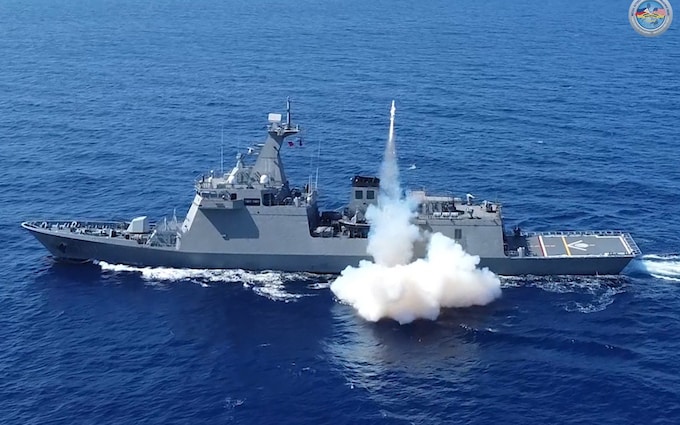China Urges Philippines To Remove Typhon Missile System For Regional Stability

Table of Contents
China's Concerns Regarding the Typhon Missile System
Perceived Threat to Regional Security
China views the deployment of the Typhon missile system as a significant threat to its regional security interests. Their concerns stem from:
- Extended Range and Capabilities: The Typhon system's reported range allows it to potentially target Chinese territory, including strategically important islands and installations in the South China Sea. This perceived threat is amplified by the system's advanced capabilities, including precision targeting and rapid deployment.
- Risk of Miscalculation and Escalation: China fears that the presence of the Typhon system could lead to miscalculations and accidental escalation of tensions. A perceived threat, even if unintentional, could trigger a rapid response, potentially leading to unintended conflict.
- Territorial Integrity Concerns: China's claim of sovereignty over much of the South China Sea directly fuels its concerns. The Typhon system, from China's perspective, represents a direct challenge to its claimed territorial integrity and its military dominance in the region. State media frequently highlights this narrative, framing the deployment as a provocative act.
Violation of Existing Agreements?
China may argue that the deployment of the Typhon system violates existing agreements or understandings between the two nations, although the specifics of such agreements are often contested.
- Lack of Transparency: The deployment may be considered a violation of informal agreements on transparency and confidence-building measures in the South China Sea. China might argue that the lack of prior notification and consultation constitutes a breach of trust.
- Legal Interpretations: Both sides have differing legal interpretations regarding maritime boundaries and the right to deploy defensive systems. These differing interpretations create a fertile ground for conflict, with each side presenting legal arguments to support their positions. Analyzing these arguments requires deep engagement with international maritime law conventions.
The Philippines' Justification for Deploying the Typhon Missile System
National Security and Self-Defense
The Philippines justifies the deployment of the Typhon missile system as a crucial element of its national security and self-defense strategy.
- Deterrence against Aggression: The system is presented as a deterrent against potential aggression from neighboring countries. The Philippines argues that the enhanced defensive capabilities offer a stronger posture against threats to its territorial integrity and maritime interests.
- Protecting Maritime Resources: The Philippines also emphasizes the importance of protecting its Exclusive Economic Zone (EEZ) and its vast maritime resources from encroachment. The Typhon system aids in this protection, offering a more robust defense against potential incursions. This is a key aspect in justifying the deployment to the domestic population.
- Addressing Asymmetries: The Philippines argues that the deployment levels the playing field, helping to address existing power asymmetries in the region. This allows them to better counter potential threats, strengthening their strategic autonomy.
Strategic Partnerships and Alliances
The Typhon system is integral to the Philippines' broader strategic partnerships and alliances, particularly its relationship with the United States.
- Strengthening Alliances: The deployment strengthens its military cooperation with the US, signaling a commitment to regional security and deterring potential aggression. This integration is seen as crucial for countering China's growing military influence in the South China Sea.
- Interoperability and Support: The alliance enhances interoperability and provides access to technical support and intelligence sharing, crucial elements in effectively utilizing the Typhon system and strengthening overall defensive capabilities.
- Implications for US-China Relations: The deployment inevitably adds complexity to the already tense US-China relationship, increasing the potential for further strategic competition in the region. Understanding this dynamic is key to evaluating the long-term consequences.
Implications for Regional Stability in the South China Sea
Increased Tensions and the Risk of Conflict
The deployment of the Typhon missile system significantly increases tensions in the South China Sea, raising the risk of accidental or intentional conflict.
- Escalatory Spiral: The deployment could trigger an escalatory spiral, with both sides taking further actions to bolster their positions. This could involve the deployment of additional military assets or increased naval patrols, leading to greater risk of miscalculation.
- Accidental Conflict: The proximity of military assets and the heightened tension could increase the likelihood of accidental clashes or incidents at sea, leading to unintended escalation.
- Regional Involvement: Other regional actors, particularly those with overlapping territorial claims or security interests, may become involved, potentially complicating the situation further and exacerbating tensions.
Diplomatic Efforts and Pathways to De-escalation
Despite the heightened tensions, diplomatic efforts and pathways to de-escalation remain crucial.
- Bilateral Negotiations: Direct bilateral negotiations between China and the Philippines remain essential for resolving this dispute and averting a potential crisis. Open communication and a willingness to compromise are paramount.
- International Mediation: The involvement of international organizations and mediators could facilitate dialogue and help to find a mutually acceptable solution. This could involve ASEAN, the United Nations, or other regional or international bodies.
- Confidence-Building Measures: Implementing confidence-building measures, such as increased communication channels and joint military exercises, could reduce the risk of miscalculation and improve mutual understanding.
Conclusion: China's Plea and the Future of the Typhon Missile System in the South China Sea
China's plea for the Philippines to remove the Typhon missile system highlights a fundamental disagreement over regional security and sovereignty in the South China Sea. The Philippines' decision to deploy the system, while emphasizing self-defense, is viewed by China as a direct challenge to its interests and claims. The implications for regional stability are significant, with the potential for escalation remaining high. The future of the Typhon missile system in the South China Sea will depend on the outcome of diplomatic efforts and the willingness of both sides to engage in constructive dialogue. The removal or continued deployment of the system will profoundly affect the security dynamics of the entire region. Stay informed about developments related to China's efforts to influence the Philippines' decision regarding the Typhon missile system and its impact on the South China Sea. Further research into international maritime law and regional security dynamics is highly recommended for a deeper understanding of this complex issue.

Featured Posts
-
 L Affaire Jaminet Kylian S Exprime Sur Le Transfert De Son Frere Melvyn
May 20, 2025
L Affaire Jaminet Kylian S Exprime Sur Le Transfert De Son Frere Melvyn
May 20, 2025 -
 Mick Schumachers Cadillac Future A World Champions Backing
May 20, 2025
Mick Schumachers Cadillac Future A World Champions Backing
May 20, 2025 -
 Tadic In Fenerbahce Transferi Kuluep Tarihine Gecen Bir An
May 20, 2025
Tadic In Fenerbahce Transferi Kuluep Tarihine Gecen Bir An
May 20, 2025 -
 F1 Drama Hamilton Och Leclerc Far Diskvalificering Analys Och Reaktioner
May 20, 2025
F1 Drama Hamilton Och Leclerc Far Diskvalificering Analys Och Reaktioner
May 20, 2025 -
 Tampoy Ereynontas Tis Aneksixniastes Leptomereies Ton Fonon
May 20, 2025
Tampoy Ereynontas Tis Aneksixniastes Leptomereies Ton Fonon
May 20, 2025
Latest Posts
-
 Potvrdeno Jennifer Lawrence Dobila Drugo Dijete
May 20, 2025
Potvrdeno Jennifer Lawrence Dobila Drugo Dijete
May 20, 2025 -
 Izvor Blizak Jennifer Lawrence Otkriva Detalje O Drugom Djetetu
May 20, 2025
Izvor Blizak Jennifer Lawrence Otkriva Detalje O Drugom Djetetu
May 20, 2025 -
 Jennifer Lawrence I Njezino Drugo Dijete Sve Sto Znamo
May 20, 2025
Jennifer Lawrence I Njezino Drugo Dijete Sve Sto Znamo
May 20, 2025 -
 Novi Clan Obitelji Lawrence Potvrda O Drugom Djetetu
May 20, 2025
Novi Clan Obitelji Lawrence Potvrda O Drugom Djetetu
May 20, 2025 -
 Je Li Jennifer Lawrence Rodila Drugo Dijete
May 20, 2025
Je Li Jennifer Lawrence Rodila Drugo Dijete
May 20, 2025
